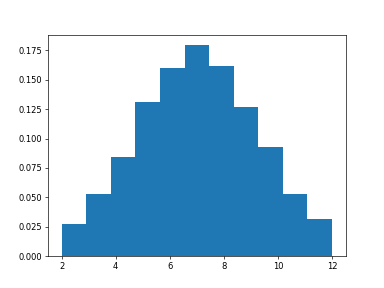nlcpy.random.RandomState.random_integers
- RandomState.random_integers(self, low, high=None, size=None)
Random integers of type nlcpy.int64/nlcpy.int32 between low and high, inclusive.
Return random integers of type nlcpy.int64/nlcpy.int32 from the "discrete uniform" distribution in the closed interval [low, high]. If high is None (the default), then results are from [1, low].
- Parameters
- lowint
Lowest (signed) integer to be drawn from the distribution (unless
high=None, in which case this parameter is the highest such integer).- highint, optional
If provided, the largest (signed) integer to be drawn from the distribution (see above for behavior if
high=None).- sizeint or tuple of ints, optional
Output shape. If the given shape is, e.g.,
(m, n, k), thenm * n * ksamples are drawn.
- Returns
- outndarray of ints
size-shaped array of random integers from the appropriate distribution.
参考
RandomState.randintReturns random integers from low (inclusive) to high (exclusive).
注釈
To sample from N evenly spaced floating-point numbers between a and b, use:
a + (b - a) * (vp.random.random_integers(N) - 1) / (N - 1.)
Examples
>>> import nlcpy as vp >>> vp.random.random_integers(5) array(2) # random >>> type(vp.random.random_integers(5)) <class 'nlcpy.core.core.ndarray'> >>> vp.random.random_integers(5, size=(3,2)) array([[5, 4], # random [3, 3], [4, 5]])
Choose five random numbers from the set of five evenly-spaced numbers between 0 and 2.5, inclusive (i.e., from the set {0, 5/8, 10/8, 15/8, 20/8}):
>>> 2.5 * (vp.random.random_integers(5, size=(5,)) - 1) / 4. array([ 0.625, 1.25 , 0.625, 0.625, 2.5 ]) # random
Roll two six sided dice 1000 times and sum the results:
>>> d1 = vp.random.random_integers(1, 6, 1000) >>> d2 = vp.random.random_integers(1, 6, 1000) >>> dsums = d1 + d2
Display results as a histogram:
>>> import matplotlib.pyplot as plt >>> count, bins, ignored = plt.hist(dsums.get(), 11, density=True) >>> plt.show()
